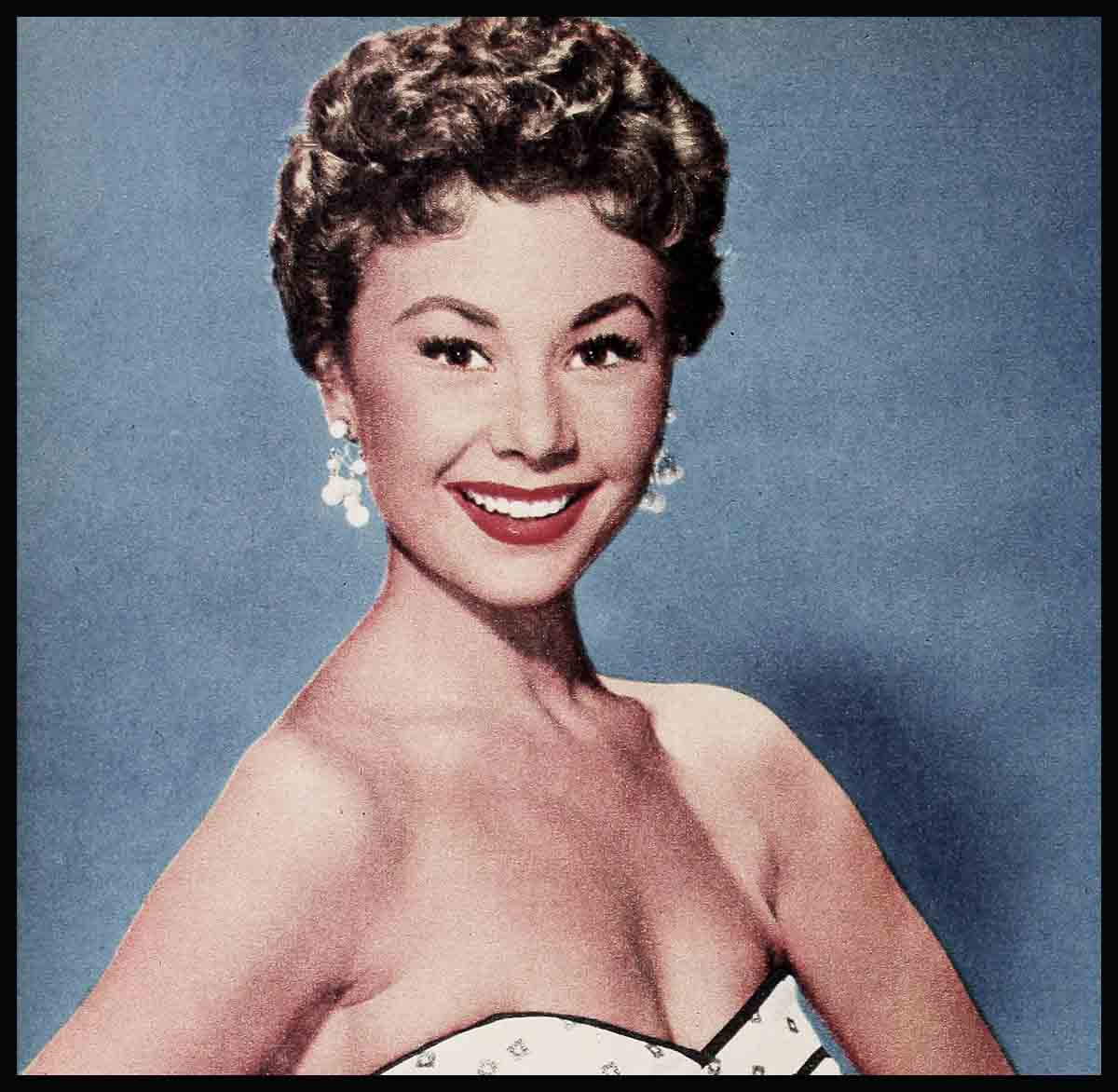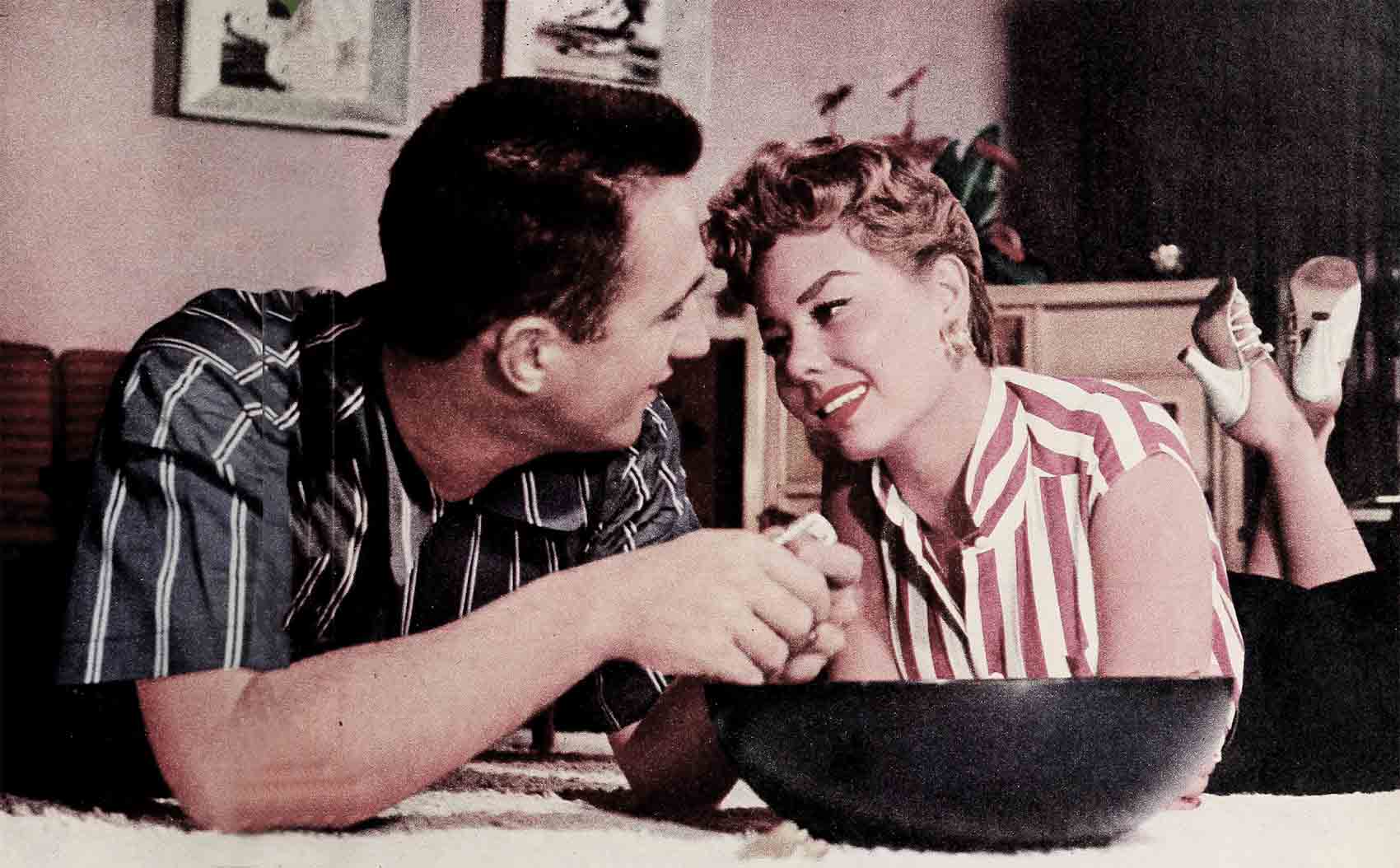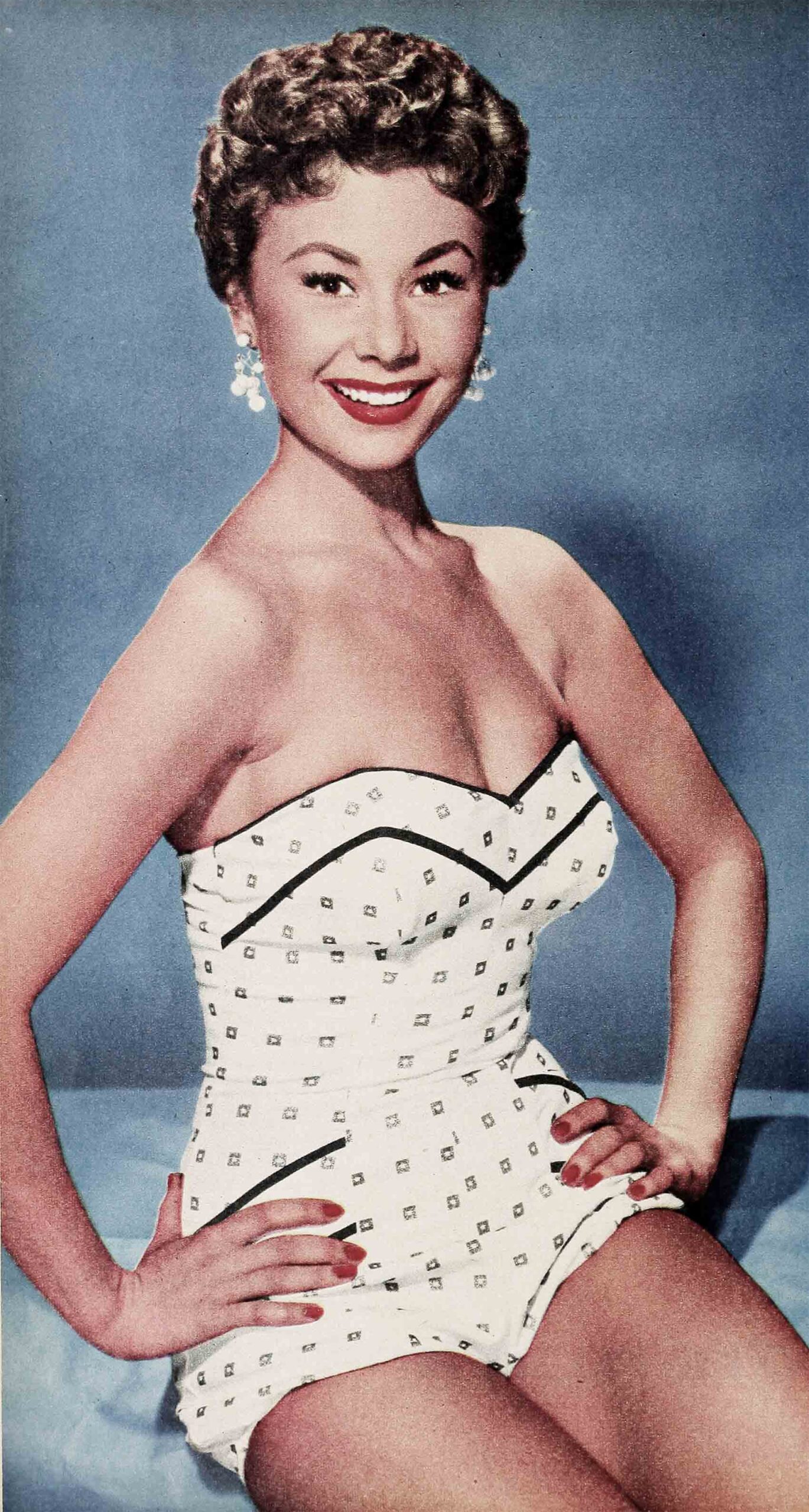
Mad About The Boy—Mitzi Gaynor
It was supposed to be a double-ring ceremony, but nobody told the gentleman who was marrying them. After Jack Bean put the ring on Mitzi Gaynor’s finger, the judge said, “I now pronounce you man and wife.” Then Jack kissed the bride. Mitzi quietly said, “Excuse me, Your Honor, but I have a ring for Jack, too. When does he get his?”
So they went through the love-honor-obey part again. This time, nobody goofed.
During their long courtship, engagement or whatever it is called in Hollywood, no one goofed except those mastermind columnists who, up until the actual ceremony, kept insisting that the romance between Mitzi and Jack Bean was not a real one. They said, as often as they could get it into print, that this was a cover-up for Mitzi’s real love. The wise guys of Hollywood never have been more mistaken.
The actual marriage took place on November 18, 1954, in San Francisco, at twelve-thirty-five P.M., but the events leading up to the happy ending were as puzzling to Mitzi as to the public.
Once before, Mitzi had been engaged for a long time, to a young lawyer named Richard Coyle, a fine gentleman, handsome and successful. Yet, with the date of marriage almost upon them, Mitzi called it off.
“I was terribly unhappy about everything,” Mitzi recalls. “We had become engaged when I was only fifteen, and four years later I realized that I had been too young to know what love really meant. Certainly, I was fond of Richard, but I didn’t feel strongly enough to be married.”
After she broke that engagement, Mitzi was unhappy, worrying about how much she had hurt Richard. Curiously, it was an incident involving her erstwhile fiancé that showed Mitzi a very attractive quality in the possession of her future husband, Jack Bean. She and Jack were having dinner on one of their first dates when young Coyle entered the restaurant. It was an uncomfortable, dramatic moment. Mitzi said at once that she wanted to leave.
“Richard never had done anything to make me feel uncomfortable,” she says in retrospect. “He’s a fine man and a gentleman. But this was the first time he had seen me out with someone else, and I felt guilty.”
At the time, Jack Bean asked no questions. As she had requested, he took her home. When they reached her apartment, he asked, “Why don’t you tell me about it?”

The words came tumbling out every which way, and Jack heard her out, his quiet grey eyes on her face. He had been crazy about this girl from the night they met, but now he refused to comfort her with phony philosophical phrases.
“Sure, you hurt him,” Jack said, honestly. “But not so much as you think. And not so much as you would have hurt him by marrying when you had fallen out of love. Breaking the engagement was the only fair thing to do.”
Mitzi was eased in her heart, and greatly impressed that she could sit and talk with this young man about another young man, trusting to his adult understanding. All this should effectively clear up the reasons behind the long-delayed wedding. You just don’t leap from one long romance to another without making sure.
Still, there were other reasons. Jack Bean, who had been an agent with Music Corporation of America, had just switched to his own public relations office, and he wasn’t about to jump into a publicity-rich elopement like many another so-called “nobody” who marries a movie star. He wanted to be settled. And Mitzi’s mother had to be considered, for she had been associated with her daughter’s career too long to allow anyone to observe that she had been unceremoniously “dumped.”
So there hasn’t been a conventional honeymoon, with two young people who are practically strangers walking hand-in-hand into a rainbow of happy-ever-after.
Happily, Mitzi’s mother, a wonderful woman, had her own plans.
After that, there was the problem of finding a house. “Believe it or not,” Jack says now, “that delayed our marriage for a long time.”
Weeks before the marriage they finally did find a home, high up in Bel Air. One they really wanted to live in until they could build their own. They signed the lease, wrote a check for the first and last month’s rent. Then, with Mitzi’s mother opening a flower shop in the Town and Country Market, Mitzi’s career zooming and Jack’s business booming, there could not have been a more auspicious time than November, 1954, to confound the cynics.
They were married in the San Francisco home of Mr. and Mrs. William French, dear enough to be considered family by Mitzi. Mitzi’s close friend, Yvonne Ruby, was her maid of honor; Jack’s best man was his best friend and business partner, Bob Rose.
“Mitzi was very calm about the whole thing,” Bobby says. “Jack? You know how people say he’s such a relaxed guy that it’s hard to imagine his getting excited? Well, let’s just say that he was as excited and nervous as anyone could imagine.”
Poor Bobby. Accustomed as he is to being cast as comic relief in the lives of his friends, this time he found himself squirming in the role of the heavy. The day Mr. and Mrs. Bean arrived in New York on their honeymoon, Bob called to say, “Hey, you don’t have the house after all. The owner didn’t cash your check or sign the lease, and now the whole deal’s off. Guess you’ll have to move into Mitzi’s apartment for a while, Jack.” That started things off on a gladsome note.

The second day there was another call from Bobby. “Uh—Jack, who handles the insurance on your car? Well, I was driving it around to keep the battery up, like you said, and some guy hit me.”
On the third day his cheerful message was, “You know about Mitzi’s giving notice when you thought you were going to get the house? Well, they’ve rented her apartment as of the first of the month. I guess we’d better move her things over to your place until you find something else.”
By this time Mitzi was holding her head. She estimated Jack’s entire apartment to be the size of a card table. But Bobby wasn’t through. He capped his earlier performances with a call the next day. “Hey, you gave notice, too, and now they’ve rented your apartment. Now you haven’t got any place to live!”
It has all the earmarks of a practical joke, but unfortunately everything Bob said was true. The young Beans were discouraged enough to give up their honeymoon, check into a Hollywood hotel, and start looking for living quarters of any nature. A friend living in Mitzi’s apartment building proved to be wonderfully resourceful, however, nailing down a two-bedroom suite there just in time for their homecoming.
Such a much, just like in the movies. A hausfrau right down to her bones, Mitzi couldn’t wait to get at the place that first day; it had to be gleaming for Jack. “And when I start cleaning,” she admits, “you’d better stand back or you’ll find yourself in with the rest of the wash!” She unpacked and stored, cleaned and scrubbed, waxed and polished; there was barely time to ease her aching body through a bath before Jack came home, but Mitzi could look, around with pride at a spotless, immaculate apartment.
Enter the bridegroom, still stinging with disappointment over the lost house in Bel, Air. “Ah, this crummy joint!” he said bitterly. “Let’s get out of here, the sooner the better!”
To his utter astonishment, the little woman burst into tears, just like in the movies, for no reason whatever that he could see. Hands on hips, Jack glared at her. “Now, don’t start that, honey. Don’t cry, honey. Aw, please don’t do that. What did I do? What’s the matter, honey?”
But don’t think he’s soft. He tolerates na nonsense. Although Mitzi loves to cook and is an expert in the kitchen, almost every noon it is Jack, big and not too deft; rattling around among the pots, pans and cans. “How’s your soup? Okay?” he asks her, as anxiously as if he had slaved over a hot stove all day. Jack doesn’t believe in spoiling new wives.
He’s thoughtful, sensitive, and very bright. “Every time he opens his mouth I don’t know what he’s talking about,” Mitzi remarked proudly the other day. “All those big words!”
Being mortal and therefore not perfect, Jack does have one addiction that amounts to a secret vice in Hollywood; he likes to read stories about his bride. Why?, “Because I learn more about her from them. Each story has a different angle and, in reading them, I find Mitzi expressing herself on subjects we haven’t even touched yet. I find facets of her personality revealed that confirm impressions of my own which I haven’t had time to sort out. I like to read the stories because they help me to understand her.”
Mitzi and Jack are still looking for that house, a reasonably small one suited to the needs of a honeymoon couple. It’s the only part of their planning that hasn’t worked out, but it will. And later, of course, there will have to be a larger place on account of the children. “I want two but Jack says more. So maybe there’ll be three.”
Mitzi has only one quarrel in all the world—with Emily Post, who says that one never, never congratulates the bride. According to Mitzi, an exception ought to be made for her. She has married a large, handsome and very masculine gent, and that’s a rare combination anywhere these days.
THE END
—BY ALICE HOFFMANN
(Mitzi Gaynor can now be seen in 20th Century-Fox’s There’s No Business Like Show Business.)
It is a quote. MODERN SCREEN MAGAZINE APRIL 1955




